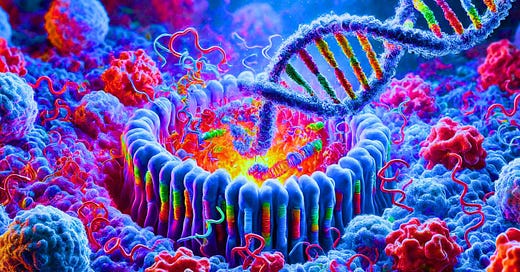COVID-19 Jab mRNA and Spike Protein Stay in Human Tissue Longer Than Expected—187 Days: Journal 'British Pharmacological Society'
Findings warrant "a careful look due to potential direct cardiotoxicity."
A new review article published Wednesday in the journal British Pharmacological Society confirms COVID-19 jab mRNA can last up to a month in the body, and spike proteins can persist over six months, potentially causing cardiotoxicity and immune response issues, with ingredient N1-methyl-pseudouridine (m1Ψ) contributing to these risks.
Follow Jon Fleetwood: Instagram @realjonfleetwood / Twitter @JonMFleetwood / Facebook @realjonfleetwood
Persistence of mRNA and Spike Proteins from COVID-19 Shot Raises Health Concerns
Initially, scientists believed that the mRNA in these shots would break down within a few days and that the resulting spike proteins would persist in the body for only a few weeks.
“It was hoped that resident and circulating immune cells attracted to the injection site make copies of the spike protein while the injected mRNA degrades within a few days,” the study explains. “It was also originally estimated that recombinant spike proteins generated by mRNA vaccines would persist in the body for a few weeks.”
However, the new study shows that the modified mRNA can last up to a month after injection.
Even more unexpectedly, the spike proteins that the jab mRNA forces the body to produce can remain in the bloodstream for over six months.
“In reality, clinical studies now report that modified SARS-CoV-2 mRNA routinely persist up to a month from injection and can be detected in cardiac and skeletal muscle at sites of inflammation and fibrosis, while the recombinant spike protein may persist a little over half a year in blood,” the study reads.
Spike protein may persist in the body for up to 187 days.
“Mass spectrometry examination of human blood specimens reported the presence of specific fragments of the recombinant spike protein after receiving mRNA-based vaccines in 50% of samples up to 187 days after vaccination,” the study confirms.
This fact “deserves a careful look” because lingering spike protein can lead to cardiotoxicity (heart dysfunction or damage).
“The increasing number of clinically challenging cases of cardiovascular complications with obscure pathologies in modified mRNA injected individuals clearly indicates the need to address mechanisms and counter actions to improve outcomes with the imminent suspension of such injections,” the study authors write.
The ongoing presence and uncertain behavior of sustained mRNA and spike proteins are critically important because of the rising reports of related structural and functional health issues in the medical literature.
“The continued persistence and uncertain fate of sustained mRNA and spike formations are of utmost importance due to morphological and functional pathologies increasingly reported in the medical literature,” the authors contend.
“The persistent nature of mRNA coding for SARS-CoV-2 spike protein provides a dangerously long exposure to an unlimited dose of this pathogenic protein, and thus, it needs re-evaluation for continued human use.”
Follow Jon Fleetwood: Instagram @realjonfleetwood / Twitter @JonMFleetwood / Facebook @realjonfleetwood
Negative Immune Response Risks Linked to mRNA Shot Component N1-Methyl-Pseudouridine (m1Ψ)
COVID mRNA vaccines contain a component called N1-methyl-pseudouridine (m1Ψ), which is said to enhance the drug’s effectiveness by stimulating the body’s immune response.
This website has reported how m1Ψ causes a “glitch” in the body’s cellular machinery whereby the system “slip[s]” and misreads the jab mRNA around 10% of the time, as documented by Cambridge University in a December 2023 Nature publication.
The misstep can cause a momentary pause, akin to a bike slipping a gear, leading to a process called “frameshifting,” a disruption in the way the genetic code in the injection is read.
Frameshifting leads to a significant undesirable immune response in approximately one-third (25-30%) of mRNA shot recipients.
The problem causes the body to produce proteins that the body identifies as foreign, resulting in an immune system response.
The production of these “rogue” proteins is enough to elicit an immune system “flare-up” response in which the body “attacks” the proteins it has made.
The new British Pharmacological Society study confirms m1Ψ can cause “long-lasting and potentially permanent” dysfunction in the body from these “off-target” proteins.
“mRNA modified by pseudouridination and other changes, including methylation, is infeasible for clinical use because of its long-lasting and potentially permanent and immunostimulatory nature,” the publication states.
Follow Jon Fleetwood: Instagram @realjonfleetwood / Twitter @JonMFleetwood / Facebook @realjonfleetwood
mRNA COVID Jab Ingredient N1-Methyl-Pseudouridine (m1Ψ) 'Stimulated Cancer Growth and Metastasis': 'International Journal of Biological Macromolecules'
A new study published earlier this month in the International Journal of Biological Macromolecules confirms that an ingredient in mRNA COVID-19 injections called N1-methyl-pseudouridine (m1Ψ) increases cancer growth and spread.
Roughly 1/3rd of mRNA COVID-19 Vaccine Recipients Experience 'Unintended Immune Response in the Body': Cambridge University, Journal 'Nature'
In a startling new study, researchers from the University of Cambridge’s Medical Research Council (MRC) Toxicology Unit have uncovered a significant unintended immune response triggered by mRNA COVID-19 vaccines in approximately one-third (25-30%) of recipients.







